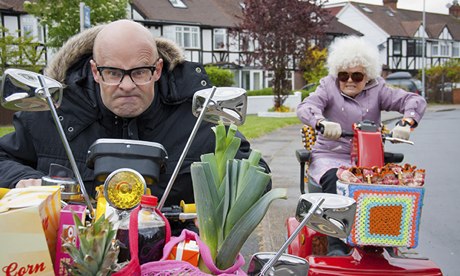
Harry Hill is the man who can do little wrong. This deranged and ebullient comic, rarely seen without his undersized black suit and oversized white collars, exhibited blithely surreal tendencies from his first standup routines in the early 1990s. A move to mainstream entertainment occurred without compromise: rather than having to shape his humour to suit viewers of his ITV show Harry Hill's TV Burp, it felt as though the Saturday teatime sensibility had to bend to accommodate him. His skew-whiff commentary on You've Been Framed even transformed that deathly show into rewarding viewing. Having proved his skill at radio, TV, standup, painting and comic novels, he moves now into two new disciplines. We will have to wait until February to see whether I Can't Sing!, his West End musical about The X Factor, will maintain his high levels of quality control. The Harry Hill Movie ("based on a true story") manifestly does not.
It begins promisingly with a mobility scooter chase (an old Seinfeld gag, but a robust one) between Harry and his nan (Julie Walters), during which Harry also delivers a baby and thwarts a bank robbery. The pair live together with their hamster, Abu, on a candy-coloured suburban street, but Harry is getting restless, and not only because of the chickens armed with second-world-war artillery in the back garden. ("You send me to bed at nine," he complains. "And why should you always get the top bunk?") Road-trip opportunities present themselves when the projectile-vomiting Abu is (mis)diagnosed as fatally ill, prompting Harry and Nan to take him for a spirit-raising trip to Blackpool ("City of a thousand dreams"). On their tail is a creepy vet (Simon Bird of The Inbetweeners) hired by Harry's long-lost evil twin, Otto (Matt Lucas), who is still peeved about being raised by a family of Alsatians in Kettering.
All this is true to Hill's patchwork style of absurdist non sequiturs, end-of-the-pier jauntiness and DIY visuals (CGI is used sparingly, with puppetry predominating). What's missing is any persuasive comic force or vision to justify the film's place in cinemas rather than in petrol station bargain bins, or on bank-holiday afternoon TV. The spell the film casts is too feeble to be enchanting, largely because the screenplay (by Jon Foster and James Lamont) is many polishes away from shining. After a zippy opening 15 minutes, the duff jokes and moribund spoofs (Kill Bill, Les Misérables, Jurassic Park) accumulate and everyone starts to look stranded and desolate on screen.
For all that, it's nice to see that Hill has stayed parochial – references to Megabuses, Nick Knowles and barbecue beef Hula Hoops ensure that the film will need footnotes if it ever plays outside the UK. The production design by Grenville Horner and Fleur Whitlock deserves special mention, veering between 1970s sitcom colours and a pick'n'mix garishness that suggests Tim-Burton-on-a-budget. Hill's persona survives the transition to the bigger screen largely undiminished, while Walters and Lucas whoop it up engagingly. Jim Broadbent, who drags up to play a cleaning lady, and Julian Barratt, as the king of a tribe of shell-encrusted ocean dwellers, are squandered. Other oddities don't quite come off. The Magic Numbers seem confused about why they are running their own B&B. Perhaps they just wonder, like the rest of us, why the musical numbers don't have a single amusing lyric between them.

